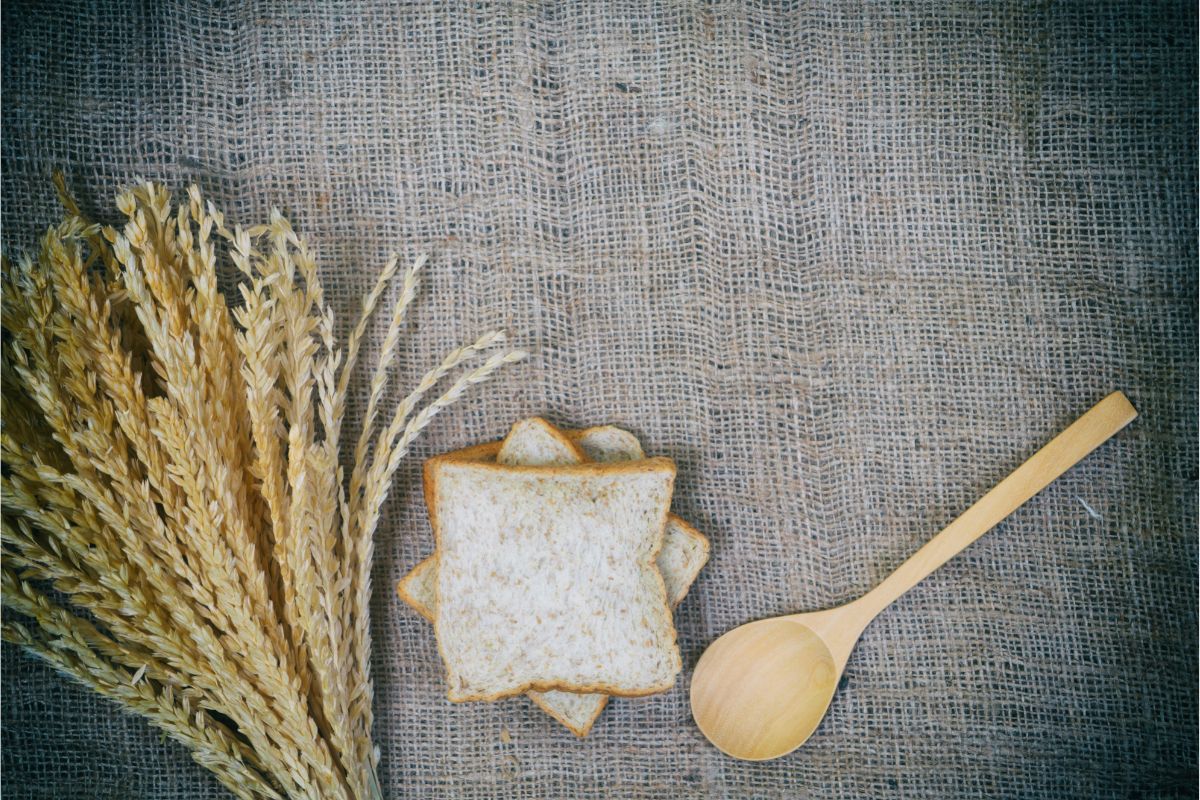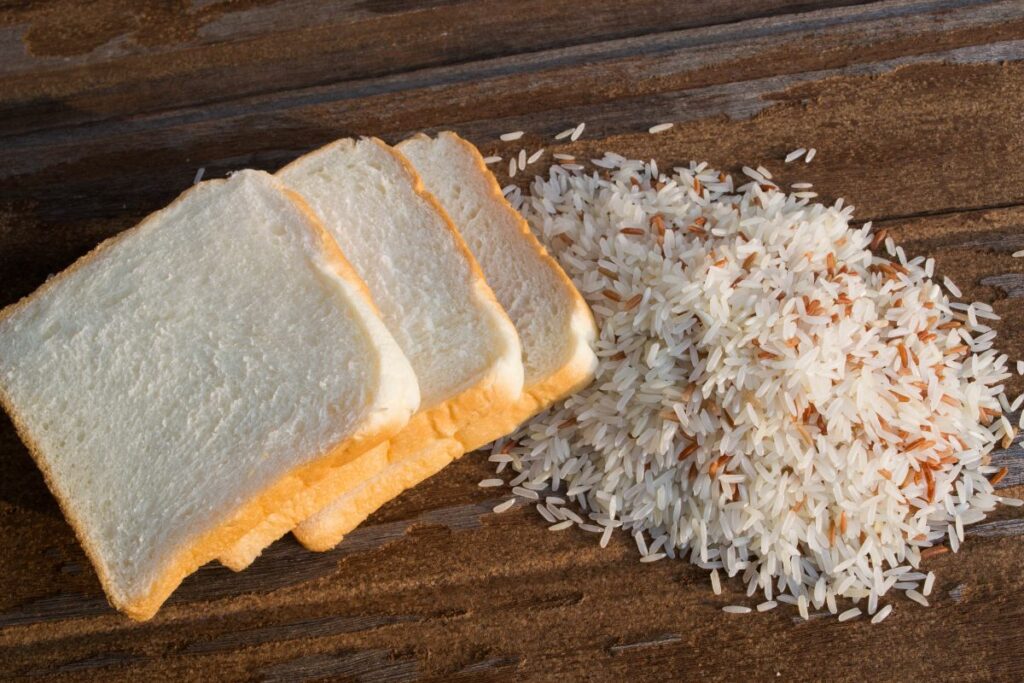Rice and bread. Two of the most common staple foods in the world. Both can be included in a variety of meals and both are delicious and filling.
But which one is better for you? Is rice better than bread? Is bread better than rice?
These days, people are making more and more conscious health decisions, so these questions will inevitably crop up.
However, we are here to help! In this article, we will discuss which staple is better for you: white and wholemeal bread or white and wholegrain rice. So, if you’re interested, read on for more!
Is Rice Better Than Bread?
It is a simple question, but it leads to a series of complex answers. Rice may be better than bread in some ways, but it is not in others.
It depends on what context you are placing these staple foods in. For example, reviewing which is better in terms of calories may yield different results compared to which is better in terms of digestion.
So, let’s take a closer look at rice and bread in a variety of different contexts and see if we can draw a conclusion.
Rice Vs Bread: Macronutrients
When it comes to macronutrients, white bread is actually more balanced than white rice. White rice consists mostly of carbs, while white bread has more of a balance in terms of nutrients. It contains more protein than white rice, as well as more fat and digestive fiber.
However, it is important to note that even though white bread contains more protein than white rice, it is still not a good source of protein. The protein in bread contains a lot of non-essential amino acids.
The situation is similar for brown rice and brown bread. Brown bread contains fewer calories per 100g than brown rice. Brown bread also has more protein than brown rice, and rice contains more carbs. Brown bread also contains more fat than brown rice.
Overall, the macronutrient count in white and brown bread, and white and brown rice, is similar.
Rice Vs Bread: Gut Microbiota
White bread has more probiotics than white rice! The probiotic in question is known as Bifidobacteria, and it has many positive benefits for the body.
White rice is not so good for gut microbiota, since it does not contain a lot of insoluble fiber.
When it comes to gut microbiota for brown bread and brown rice, then brown rice is excellent for your gut health!
Brown rice increases lactobacilli, a type of probiotic bacteria, as well as other excellent probiotics, in the body, which is great for gut health.
Brown rice is shown to impact the intestine’s microbial composition to help reduce any diabetic properties in the body, as well as obesity.
Brown bread is also great for your gut, too. It is high in fiber which helps the gut to function correctly and promotes good gut bacteria.
Rice VS Bread: Vitamins
Vitamins are extremely important for DNA and cell division. Neither rice nor bread is high in vitamins.
- ½ cup of white rice consists of 77 micrograms of folate.
- 1 slice of white bread consists of 43 micrograms of folate.
- Meanwhile, brown bread and brown rice contain a negligible amount of vitamins.
Rice VS Bread: Minerals
Out of the four choices in this article, brown rice is the best when it comes to minerals. It contains 42 mg of magnesium.
Magnesium works to strengthen your bones, helps you maintain your heartbeat, and improves the functioning of your immune system.
Meanwhile, white rice and bread types have small amounts of these minerals and are therefore not a great mineral source.
Should You Eat Bread Or Rice For Fat Loss?
When comparing bread and rice lb for lb, then it is better to eat both brown and white bread to lose weight because they have fewer calories than brown and white rice.
If you have a fat loss goal, then it may be better to eat bread than rice because carbs have a lower thermic effect than protein, which means that you burn more calories when you eat protein, especially compared to carbs.
Not only that, but bread is higher in fiber and protein, so it will make you feel fuller for longer.
Should You Eat Bread Or Rice To Build Muscle?
If you want to build muscle, then rice is a better choice than bread. To build muscle, then you need a higher calorie intake.
You also need to be able to digest food quicker. Rice has both of those qualities and is therefore more suitable for muscle building.
Brown rice is also excellent at helping you to build muscle because it has significant levels of dietary fiber.
White Bread And Rice VS Whole Meal And Wholegrain Bread And Rice
As well as trying to decide between bread and rice, you also need to decide whether to include more white or brown variants of these staples in your diet.
So, let’s check out some of the key differences between refined foods and their whole-food counterparts!
White bread and white rice are processed foods, stripped of their germ and bran. Processed foods contain added flavoring, starches, and sugars, while whole foods are not manufactured. Brown bread and brown rice are an example of whole foods.

White VS Brown Bread
On the whole, brown bread is better for you than white bread. It contains more vitamins and minerals than white bread, and it is much richer in fiber, protein, and fat.
For example, on average one slice of regular, wholewheat bread contains:
- 91 calories
- 4 g protein
- 1 g fat
- 15 g carbohydrates
- 2 g fiber
Meanwhile, on average, one slice of regular white bread contains:
- 75 calories
- 2 g protein
- <1 g fat
- 15 g carbohydrates
- 1 g fiber
Overall, wholemeal bread is better for our health in many different areas than white bread.
White VS Brown Rice
Brown rice is also known as wholegrain rice, and with this type of rice, the outer husk is removed through a process called milling.
Meanwhile, milling is a longer process when it comes to white rice, and is used to remove the bran and the germ, as well as the outer husk.
Because of this stripping process, white rice contains fewer nutrients and less fiber than brown rice.
For example, according to the FDA, one cup of brown rice contains, on average:
- 1.6 g fat
- 3.5 g dietary fiber
- 1 mg iron
- 19.5 mg calcium
- 154 mg potassium
- 150.2 mg phosphorus
- 1.2 mg zinc
Meanwhile, 1 cup of white rice contains, on average:
- 0.4 g fat
- 0.6 g dietary fiber
- 1.9 mg iron
- 15.8 mg calcium
- 55.3 g potassium
- 0.8 mg zinc
Final Thoughts
Neither rice nor bread is better for you overall, as you should choose one or the other depending on your goals.
For example, if your goal is to lose fat, then it is better to eat bread because it is lower in calories and will help you to feel fuller for longer because it contains more protein.
However, rice, brown rice, in particular, has a high amount of dietary fiber and is, therefore, better for building muscle compared to bread.
It is also important to consider whether or not you should include more white rice and bread, or brown rice and bread, in your diet.
Overall, brown rice and bread are better for you than their refined counterparts because they have more nutrients such as vitamins and minerals, more fiber, and will therefore provide more benefits for your health.








